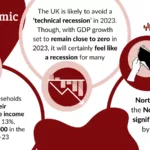Recession in Canada.
First quarter of 2023 in its place of the second quarter
A recession will take hold in Canada inside the primary quarter of 2023, sooner than it initially predicted, economists at Canada’s largest financial institution acknowledged Wednesday.
Royal Monetary institution made waves in July when its economics retailer grew to develop into the primary on Bay Avenue to forecast a recession.
Claire Fan and Nathan Janzen initially predicted the downturn would come contained in the second quarter, nonetheless in a mannequin new report they acknowledged fairly a couple of parts will “hasten the arrival of a recession in Canada,” together with rising prices of curiosity.
Sign as so much as obtain the daily extreme tales from the Financial Publish, a division of Postmedia Neighborhood Inc.
A welcome e-mail is on its technique.
When you do not see it, please test your junk folder.
The subsequent disadvantage of Financial Publish Excessive Tales will shortly be in your inbox.
We encountered a problem signing you up. Please try as quickly as further

“Cracks are forming in Canada’s monetary system,” Fan and Janzen wrote.
Housing markets have cooled considerably and though the labour market stays sturdy, posting an unemployment charge of 5.2 per cent in September, indicators of weak degree have appeared together with a shortage of 92,000 positions over the sooner 4 months.
Nonetheless, prices of curiosity will play probably primarily essentially the most “essential” function contained in the monetary system’s trajectory, the authors wrote. They forecast the Monetary institution of Canada will elevate its benchmark lending price to 4 per cent from 3.25 per cent presently prior to pausing price hikes in late 2022.
The USA, they acknowledged, will proceed mountaineering by way of the remainder of the yr — to between 4.5 per cent and 4.75 per cent — prior to taking a breather early subsequent yr. The larger borrowing prices will create headwinds that the monetary system acquired’t be succesful to push by way of, Fan and Janzen wrote.
In any case, the central banks’ actions depend on inflation. In Canada, the headline quantity sits at seven per cent, off the four-decade excessive of 8.1 per cent in June, nonetheless nonetheless accurately above the Monetary institution of Canada’s objective of two per cent.
“Further cussed inflation traits over the approaching months could nevertheless speedy additional hikes, and a doubtlessly larger decline in family consumption and a deeper recession,” Fan and Janzen wrote.
The pair calculated that $3,000 in frequent purchasing for vitality shall be misplaced subsequent yr on account of elevated borrowing prices and the upper value of dwelling. Which implies households could have so much a lot much less money accessible to drive progress.
“This could sometimes weigh most intently on Canadians on the decrease finish of the wealth spectrum, notably these whose disposable revenue has gentle alongside pandemic assist,” the authors acknowledged.
Completely totally different calls contained in the report embrace that the unemployment price will rise to close seven per cent by the best of subsequent yr, a value that they observe could also be low relative to earlier downturns.
Sooner than laying workers off, Fan and Janzen predict that employers will first lower hours, and that job openings will decline inflicting workers to want to look longer for a spot.








